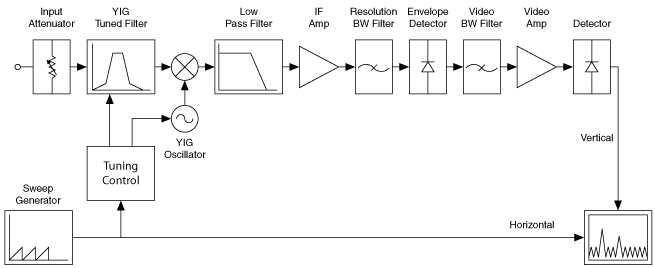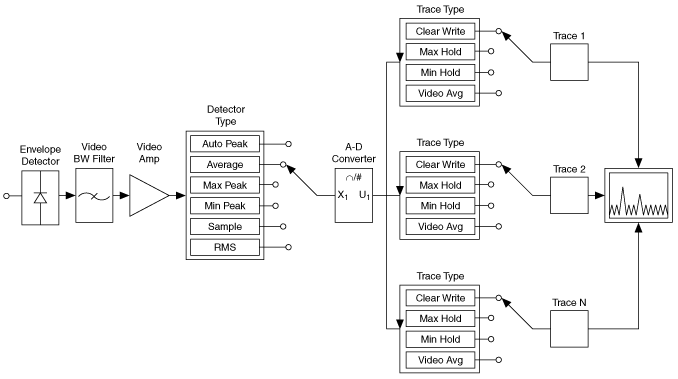IviSpecAnBase Capability Group Overview
The IviSpecAnBase capability group supports spectrum analyzers that configure and take a frequency sweep. A frequency sweep is thought of as adjusting the frequency of a tuner from the start frequency to the stop frequency in a defined amount of time. For more information about time domain measurements, refer to Time Domain Measurements. While the tuner is being adjusted, power levels (or voltage levels) are being measured for the frequencies. The result is an array of amplitude versus frequency data. In addition to configuring the start and stop frequency, a user can also set a frequency offset. This affects the setting of the spectrum analyzer's absolute frequencies, such as start, stop, center, and marker. It does not affect values, which are the difference of frequencies, such as span and delta marker.
The IviSpecAnBase capability group also includes VIs for configuring the analyzer as well as initiating and retrieving measurements. This includes configuring the sweep, range, and resolution. A typical spectrum analyzer does not have several input channels. It can, however, have several traces. Multiple traces are covered in the IviSpecAnMultitrace extension group. The trigger VIs are covered in Trigger, External Trigger, and Video Trigger extension groups.
In addition, most spectrum analyzers have a coupled function mode, which links the resolution bandwidth (RBW), video bandwidth (VBW), and sweep time together. For more information about this behavior, refer to Sweep Coupling Overview.
The following figure shows the tuning, filtering, and detection process in a typical spectrum analyzer.

The following figure shows how the detector detects the signal and outputs the signal on multiple traces.

Sweep Coupling Overview
Many spectrum analyzers are capable of coupling the resolution bandwidth, video bandwidth, and sweep time together. The instrument makes decisions based on the various settings to ensure the accuracy of the measurement. If you elect to choose the settings, it is possible to place constraints on the system that make accurate measurements impossible. Most analyzers respond to this condition with a message indicating that the measurement is uncalibrated.
When all the settings are coupled, the instrument makes decisions along the following hierarchy. The RBW and VBW are typically locked together and set for 1% of the span. For example, if the span were set for 100 MHz, the instrument chooses 1 MHz for the RBW and VBW. To measure very low signal levels, the RBW may need to be more narrowed, which slows the sweep speed. Lastly, the sweep time is dependent on the RBW and the VBW. As a rule of thumb:
Sweep Time * Span / RBW2
As can be seen from the above equation, the RBW has a drastic effect on sweep speed. These are issues to keep in mind when developing automated tests.
When considering interchangeability and measurement accuracy, it is important to consider the way different instruments couple settings together. The valid combination of RBW, VBW, and sweep time on one spectrum analyzer may not be a valid combination on another spectrum analyzer. Awareness of these differences ensures that the results obtained in one system correlate with the results from another system.
IviSpecAnBase Functions
IviSpecAn_ConfigureAcquisition
IviSpecAn_ConfigureFrequencyCenterSpan
IviSpecAn_ConfigureFrequencyOffset
IviSpecAn_ConfigureFrequencyStartStop
IviSpecAn_ConfigureSweepCoupling
IviSpecAnBase Attributes
IVISPECAN_ATTR_AMPLITUDE_UNITS
IVISPECAN_ATTR_ATTENUATION_AUTO
IVISPECAN_ATTR_DETECTOR_TYPE_AUTO
IVISPECAN_ATTR_FREQUENCY_START
IVISPECAN_ATTR_FREQUENCY_OFFSET
IVISPECAN_ATTR_INPUT_IMPEDANCE
IVISPECAN_ATTR_NUMBER_OF_SWEEPS
IVISPECAN_ATTR_REFERENCE_LEVEL
IVISPECAN_ATTR_REFERENCE_LEVEL_OFFSET
IVISPECAN_ATTR_RESOLUTION_BANDWIDTH
IVISPECAN_ATTR_RESOLUTION_BANDWIDTH_AUTO
IVISPECAN_ATTR_SWEEP_MODE_CONTINUOUS
IVISPECAN_ATTR_SWEEP_TIME_AUTO
For an instrument with only one Trace, i.e., the Trace Count attribute is one, the driver may return an empty string.
IVISPECAN_ATTR_VIDEO_BANDWIDTH